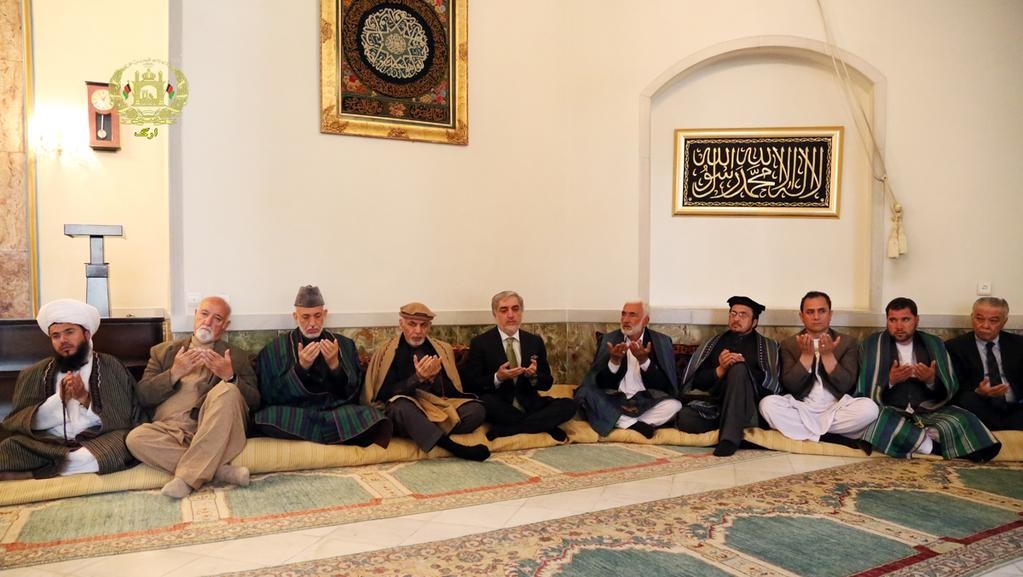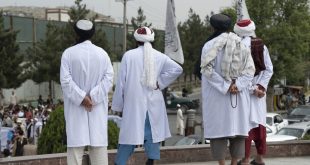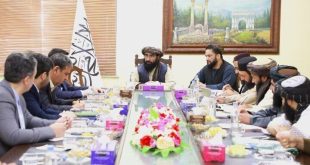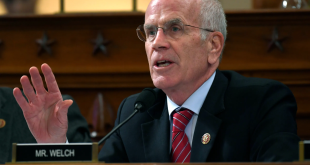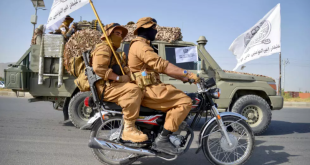One opposition faction is a group championed by former President Hamid Karzai that is calling for a loya jirga, a grand council of tribal elders, to decide Mr. Ghani’s fate. A jirga, at its heart an unpredictable event, could not only upend the cycle of elections as the democratic transfer of power, but risk putting other issues, like the United States military’s presence, up for discussion.
By Mujib Mashal
KABUL: Over the past year, as Afghanistan’s strained power-sharing government struggled in the face of intense criticism, Western officials repeatedly stepped in to urge patience.
American and European diplomats shuttled to the blast-wall-protected villas of the country’s political elite, asking them to give President Ashraf Ghani some space to keep pursuing the reforms that had rankled so many. In return, Mr. Ghani would finally deliver parliamentary elections (already delayed by two years) before the next presidential vote.
But the year is closing with little progress toward the elections, still scheduled for next July, although now almost certain not to occur then. Mr. Ghani’s critics — and there are more than ever — are losing patience, turning to public demonstrations, issuing ultimatums or threats, and joining in calls for a nationwide, traditional referendum on his authority.
The Afghan president, in return, has reacted in ways that many Western officials see as panicked. He has ordered sudden corruption investigations against critics, barred government employees from joining demonstrations and been accused of grounding the flight of a powerful northern governor to keep him from joining an opposition meeting.
One fear is that the rising factional animosity could lead to open mutiny — in the middle of a raging war against the Taliban and Islamic State loyalists — against a government that Western officials have gone all out to hold together.
Mohammed Umer Daudzai, a former interior minister who is now part of one of the larger opposition groups, said the lack of progress on elections was a symptom of a broader problem: the government’s shrinking political base.
“When he started as president, his political base was formed by 54 political groups that were meeting on a weekly basis to support the president. I doubt if three of the 54 are left with him,” Mr. Daudzai said. “They have lost their political base, they have lost their political credibility, and that’s very bad because this country is built on political consensus.”
Many Western diplomats in Kabul are frustrated by Mr. Ghani’s lack of progress on elections, with some even beginning to question whether he ever intended to hold them. But they are divided about how ominous the situation is.
So far, the political opposition is really a host of smaller ones: a wide range of coalitions made up of former warlords, former government ministers and members of Parliament united by little more than what they see as Mr. Ghani’s political mismanagement and his inability to deliver elections.
One opposition faction is a group championed by former President Hamid Karzai that is calling for a loya jirga, a grand council of tribal elders, to decide Mr. Ghani’s fate. A jirga, at its heart an unpredictable event, could not only upend the cycle of elections as the democratic transfer of power, but risk putting other issues, like the United States military’s presence, up for discussion.
Some other groups are very critical of Mr. Ghani but have agreed to show restraint as long as he delivers elections and electoral reforms. In recent weeks, many of those groups have said that they do not believe Mr. Ghani is serious about holding the vote next year, raising the possibility that they could join Mr. Karzai’s move for a loya jirga.
“The situation shows that preparations for elections are not there, not in the way that is necessary,” said Abdul Rab Rassoul Sayyaf, a former warlord who leads the opposition coalition to which Mr. Daudzai belongs. “If the elections don’t happen, this country will go to a dangerous crisis.”
Some of Mr. Ghani’s aides lament that their technocratic leader has struggled to balance the demands of keeping political constituencies at his side while prioritizing his reform agenda. He is often occupied for hours leading meetings on issues that a subordinate could have handled.
Other advisers say that the president is determined to make elections happen, but that he is a victim of deep political divisions, undermined at every turn by a Parliament that has stalled his legislation and cabinet choices.
“The president knows it has taken a longer time on the elections,” said Nader Nadery, a senior adviser to Mr. Ghani. “When he has tried to use his convening powers to move election issues, he is told the perception is he is too close to the process and he is interfering. When he has backed off and let the process do its work, they say he doesn’t have the political will to hold elections.”
For American officials, the pressure mounting on Mr. Ghani has been particularly awkward: Some of their closest Afghan allies over the years, still essential to the military campaign, are rallying against a political leadership in Kabul that is perceived to be protected by the Americans. (Mr. Ghani shares half of the cabinet posts with his coalition partner, Abdullah Abdullah, who has the title chief executive. Yet the president is at the receiving end of most of the pressure.)
The largest recent rally against Mr. Ghani was organized in Kandahar Province on Dec. 2. The invitation list included more than 70 members of Parliament, former governors and cabinet ministers, and some local elders. Many in the front row had been vocal supporters of Mr. Ghani, helping elect him to office.
Playing host behind the scenes was Gen. Abdul Raziq, the province’s police chief, whose influence stretches across much of southern Afghanistan, largely because of the American military’s support for him.
Afghan and Western officials say that American military leaders — including the senior commander in Afghanistan, Gen. John W. Nicholson Jr. — spoke to General Raziq as the rally got underway, though their message for him was unclear.
A spokesman for General Nicholson, Navy Capt. Tom Gresback, would not comment on the nature of his “many engagements across Afghanistan,” but said that the commander encourages Afghan police and military leaders to remain apolitical.
Before the Kandahar rally, Mr. Ghani barred government employees from attending such opposition gatherings. He ordered an investigation into the private township in Kandahar developed years ago by the Karzai family — which happened to be where the rally was taking place.
One of the key participants there was supposed to be Atta Mohammed Noor, a former warlord who remains at the helm of Balkh Province, a prosperous area in the north, despite Mr. Ghani’s attempts to oust him. As Mr. Noor and dozens of other northern leadership figures prepared to fly to Kandahar, their plane was refused permission to take off.
“The leadership of the government did not give us permission to go to Kandahar,” Mr. Noor said. “This is an unlawful, unethical and inhumane action. I hope they come to their senses.”
In Kandahar, the rally was delayed for a second time in the hopes that Mr. Noor would make it.
“We are giving this government a clear warning: that if Mr. Noor is not given permission to fly within 12 hours, the consequence will be very bad,” said Humayoon Humayoon, the deputy speaker of Parliament and one of the rally leaders who used to strongly support Mr. Ghani. “This the death of democracy, for which we have given a lot of sacrifices. We cannot live in the presence of a dictator president.”
When the rally finally happened, without Mr. Noor, it turned out to be smaller than billed.
Mr. Ghani’s advisers have seized on that, insisting that threats of mobilization against the president are mostly bluffing. They see much of the political opposition as the old patronage networks halting Mr. Ghani’s reform efforts to protect their own fortunes.
Opposition leaders say that is precisely the kind of black-and-white thinking that has left the government struggling politically.
Meanwhile, the election reforms that Mr. Ghani promised as a precursor to the parliamentary vote have still not coalesced.
The country’s electoral commission was a focal point of accusations of fraud surrounding Mr. Ghani’s election in 2014, but an overhaul and reconstitution of that panel remain incomplete: It lacks a leader and about 40 percent of its staff. Nationwide, the number of polling stations in every area, a politically and ethnically delicate issue in a country that lacks reliable census data, has yet to be finalized.
Financing for the vote, which could cost as much as $200 million, still remains unresolved, although the international community has footed the bill for past elections.
Particularly important is the issue of a new voter list. Millions more voting cards are in circulation than the country’s number of eligible voters. Cards have been issued in the names of Tom Cruise, Bruce Lee, Arnold (Schwarzenegger, known here by his first name alone) and, by some accounts, Britney Spears.
Abdullah Ahmadzai, a former chief electoral officer of the election commission, said votes repeatedly unearthed some of Afghanistan’s deepest social and political fracture lines, every time requiring heavy-handed Western intervention to find a way out. Yet there has been little success in working to ensure that the next election is less of a threat to stability.
“You can’t keep all the ambiguities there every time and still expect fair elections,” Mr. Ahmadzai said. (The New York Times)
 Afghanistan Times
Afghanistan Times
